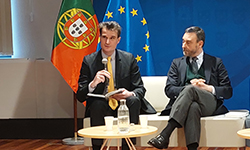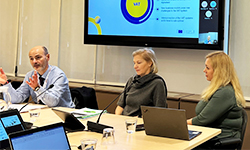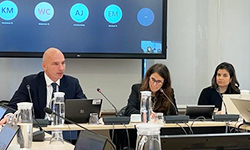BusinessEurope Headlines No. 2023-03
Trade policy is key to support the EU’s international competitiveness

The EU needs an ambitious trade agenda to support its international competitiveness. We need more and better access to key raw materials and more export opportunities for our companies to and from fast growing markets. Trade agreements are key in our diversification and risk mitigation efforts and therefore we need to speed up ratification of concluded agreements. Despite the current challenges the transatlantic relationship remains fundamental. We need to address current irritants including those created by the U.S. Inflation Reduction Act and continue to engage through the Trade and Technology Council to move our relationship further. These were some of the topics discussed at a meeting between BusinessEurope President Fredrik Persson, Director General Markus J. Beyrer and European Commission Executive Vice-President Valdis Dombrovskis.
Contact: Luisa Santos
Photo © European Union, 2023
Video messages
Transatlantic relations: state of play and priorities
What’s the current state of play of the transatlantic relations and what are the key priorities for closer cooperation? We asked these questions to the U.S. Chamber of Commerce Executive Vice President Myron Brilliant on the occasion of his visit to Brussels. Watch his comments.
EU response to IRA: business expectations
What are the business expectations on the EU response to the U.S. Inflation Reduction Act? See our Director General Markus J. Beyrer comment on this.
Our comment
The EU’s paradox of standardisation and geopolitics
By Jan Rempala, Adviser for Internal Market

The European standardisation model is an important piece of the puzzle that makes the European Union a leader in offering innovative and safe products and services. This model is all about making sure that everyone's interests are taken into account when setting standards for products and services, from businesses to consumers to regulators. It's this market-driven private-public partnership that has made the EU a major player in global standardisation efforts, with many European standards being used around the world.
As we reflect on the anniversary of the EU standardisation strategy, launched on 2 February last year, it’s clear standardisation will continue to be prominent in the headlines and for politicians. This strategy crystalises many of the geopolitical anxieties that policy-makers are worrying about – the crucial question being how can the EU position itself globally? A common mantra in the realm of standards that is often repeated is: “Europe should be a standard setter, not taker”. This is doubly reinforced by loads of new legislation, especially in the green and digital areas, beginning to prescribe technical standards to meet the respective legislative demands.
Europe, accordingly, is trying to develop as many standards as possible to meet the demands of the emerging 21st century. But we risk overcomplicating things with legislation that not only seeks to issue new standards but attempts to tackle specific details that are best left to the technical expertise of our European standardisation organisations.
Paradoxically though we must remain vigilant that, in our pursuit of using these new legislative initiatives to create a stronger international European presence in standardisation, we do not undermine ourselves and provide an excuse for other actors to simply leave our processes and establish their own. Our inclusive system for European standards is a carefully crafted ecosystem that thrives on open partnership.
To that end BusinessEurope will continue defending our European order of standards - and we have started 2023 off strong: already in January we highlighted this sentiment during the opening meeting of the European Commission’s newly formed High Level Forum on Standardisation and in the European Parliament Committee on Internal Market and Consumer Protection hearing on standardisation.
By avoiding decoupling from the international standardisation scene, remaining open to participation from non-EU partners, and maintaining a consensus-based approach, the EU can continue to offer top-notch products and services that meet the needs of its people.
Contact: Jan Rempala
Urgent need to reinstate the Single Market as a true free-trade area
 “Businesses no longer experience the Single Market as a true free-trade area. The Single Market is the bedrock of the EU economy, however, a mass of incoming EU legislation does not only create disproportionate additional regulatory burdens but also allows for market fragmentation too often”, said Martynas Barysas, Director of BusinessEurope’s Internal Market Department, during a seminar organised by the Dutch business associations VNO-NCW and MKB-Nederland on the occasion of the 30th anniversary of the EU Single Market. Together with BusinessEurope, the European Trade Union Institute (ETUI), the Dutch Ministry of Economic Affairs and Climate and the European Round Table for Industry (ERT) took stock of the state-of-play of the Single Market and discussed necessary changes to promote a resilient future Single Market agenda. Referring to a joint industry statement issued by European businesses in June last year, BusinessEurope underlined the urgent need for the EU to reinstate the idea of a Single Market as an economic union for free trade without internal barriers. “The EU should not get into a spiral of new regulations, then provide state aid for companies to alleviate increasing pressures and costs, then yet more regulations, and yet more state aid… Businesses need the regulatory fragmentation and burdens to be addressed”, he reiterated. Actions at EU level, such as those to deepen the Single Market, should be supported by Member States through their actions at national level, like implementing necessary structural reforms.
“Businesses no longer experience the Single Market as a true free-trade area. The Single Market is the bedrock of the EU economy, however, a mass of incoming EU legislation does not only create disproportionate additional regulatory burdens but also allows for market fragmentation too often”, said Martynas Barysas, Director of BusinessEurope’s Internal Market Department, during a seminar organised by the Dutch business associations VNO-NCW and MKB-Nederland on the occasion of the 30th anniversary of the EU Single Market. Together with BusinessEurope, the European Trade Union Institute (ETUI), the Dutch Ministry of Economic Affairs and Climate and the European Round Table for Industry (ERT) took stock of the state-of-play of the Single Market and discussed necessary changes to promote a resilient future Single Market agenda. Referring to a joint industry statement issued by European businesses in June last year, BusinessEurope underlined the urgent need for the EU to reinstate the idea of a Single Market as an economic union for free trade without internal barriers. “The EU should not get into a spiral of new regulations, then provide state aid for companies to alleviate increasing pressures and costs, then yet more regulations, and yet more state aid… Businesses need the regulatory fragmentation and burdens to be addressed”, he reiterated. Actions at EU level, such as those to deepen the Single Market, should be supported by Member States through their actions at national level, like implementing necessary structural reforms.
![]() Contact: Michelle Marie Philipp
Contact: Michelle Marie Philipp
The Data Act is a leap into the unknown
 Together with 29 other EU associations, BusinessEurope issued a joint statement highlighting the need for more time to build a framework that supports Europe’s data economy. “Data sharing will be fundamental to the success of the European economy in the coming years, with data contributing at least €1 trillion by 2030. But the Data Act as it stands is a huge leap into the unknown, affecting the fundamentals of European companies’ data-driven business models, with only the promise of a better data future”, reads the statement.
Together with 29 other EU associations, BusinessEurope issued a joint statement highlighting the need for more time to build a framework that supports Europe’s data economy. “Data sharing will be fundamental to the success of the European economy in the coming years, with data contributing at least €1 trillion by 2030. But the Data Act as it stands is a huge leap into the unknown, affecting the fundamentals of European companies’ data-driven business models, with only the promise of a better data future”, reads the statement.
![]() Contact: Svetlana Stoilova
Contact: Svetlana Stoilova
Business & human rights: more focus needed internationally on state responsibilities
 The European legislative debates on due diligence have hitherto largely focused on business responsibility to respect human rights. Making EU rules workable for business is our first priority. But the EU also has a role to support European companies in being better informed and supported when investing or doing business in third countries where human rights violations exist. The EU needs to step up its game to make sure that the real challenge of insufficient protection of human rights by a significant number of states around the world is acted upon in the future. The United Nations (UN) discussions on business and human rights should focus on this. BusinessEurope looks forward to cooperating with the European External Action Service to that end. Having more countries outside the EU developing national action plans under the UN guiding principles (UNGPs) on business and human rights is an important objective in this regard. These were the key messages conveyed by Maxime Cerutti, BusinessEurope Director for Social Affairs, at the event ‘’The role of the EU in the global debate on human rights & due diligence’’, organised by the Permanent Representation of Portugal to the European Union on 27 January.
The European legislative debates on due diligence have hitherto largely focused on business responsibility to respect human rights. Making EU rules workable for business is our first priority. But the EU also has a role to support European companies in being better informed and supported when investing or doing business in third countries where human rights violations exist. The EU needs to step up its game to make sure that the real challenge of insufficient protection of human rights by a significant number of states around the world is acted upon in the future. The United Nations (UN) discussions on business and human rights should focus on this. BusinessEurope looks forward to cooperating with the European External Action Service to that end. Having more countries outside the EU developing national action plans under the UN guiding principles (UNGPs) on business and human rights is an important objective in this regard. These were the key messages conveyed by Maxime Cerutti, BusinessEurope Director for Social Affairs, at the event ‘’The role of the EU in the global debate on human rights & due diligence’’, organised by the Permanent Representation of Portugal to the European Union on 27 January.
Contact: Stefan Enica
VAT in the Digital Age: what it needs to be successful
 A uniform application of VAT rules across the EU and a VAT system that ensures efficiency and support for a stronger and more competitive economy should be the main objectives of the VAT in the Digital Age (VIDA) legislative proposal. This was the key message of the VAT Policy Working Group when it welcomed Patrice Pillet, Head of Unit on VAT and Agnes Fekete, Team Leader in the European Commission Directorate-General for Taxation and Customs Union (DG TAXUD) to its meeting on 1 February. Pillet provided an overview of the proposed legislative package that is aimed at modernising the VAT rules and fighting VAT fraud. The group expressed its support towards the Commission’s efforts to update the existing VAT rules in order to adapt them to the developments of the digital economy. However, it noted that any proposal in this field should be supported by an impact assessment focusing on the effectiveness of the rules and contain realistic time frames for implementation in order to reduce administrative burdens and compliance costs for businesses.
A uniform application of VAT rules across the EU and a VAT system that ensures efficiency and support for a stronger and more competitive economy should be the main objectives of the VAT in the Digital Age (VIDA) legislative proposal. This was the key message of the VAT Policy Working Group when it welcomed Patrice Pillet, Head of Unit on VAT and Agnes Fekete, Team Leader in the European Commission Directorate-General for Taxation and Customs Union (DG TAXUD) to its meeting on 1 February. Pillet provided an overview of the proposed legislative package that is aimed at modernising the VAT rules and fighting VAT fraud. The group expressed its support towards the Commission’s efforts to update the existing VAT rules in order to adapt them to the developments of the digital economy. However, it noted that any proposal in this field should be supported by an impact assessment focusing on the effectiveness of the rules and contain realistic time frames for implementation in order to reduce administrative burdens and compliance costs for businesses.
Contact: Mariella Caruana
Exchange of views on tax policy with the European Commission
 The Deputy Head of Unit at the European Commission Directorate-General for Taxation and Customs Unions, Astrid Van Mierlo, set out the Commission’s recent work in areas such as the withholding tax refund procedures; some aspects of the “Business in Europe: Framework for Income Taxation” initiative; the Pillar One of the OECD/G20’s Two-Pillar Framework; and the eighth amendment to the Directive on Administration Cooperation in the field of taxation aimed at regulating crypto assets; when participating at BusinessEurope's Tax Policy Working Group meeting on 1 February. Our members had the opportunity to exchange views with her, noting that any initiatives in this field should be based on global taxation principles in order to ensure European companies’ competitiveness and to guarantee a global level playing field.
The Deputy Head of Unit at the European Commission Directorate-General for Taxation and Customs Unions, Astrid Van Mierlo, set out the Commission’s recent work in areas such as the withholding tax refund procedures; some aspects of the “Business in Europe: Framework for Income Taxation” initiative; the Pillar One of the OECD/G20’s Two-Pillar Framework; and the eighth amendment to the Directive on Administration Cooperation in the field of taxation aimed at regulating crypto assets; when participating at BusinessEurope's Tax Policy Working Group meeting on 1 February. Our members had the opportunity to exchange views with her, noting that any initiatives in this field should be based on global taxation principles in order to ensure European companies’ competitiveness and to guarantee a global level playing field.
Contact: Mariella Caruana
Calendar 
- 8 February: BusinessEurope’s SME Roadshow. First stop Helsinki. Are we doing enough for European SMEs?
- 23-24 March: ERA Annual Conference on European Labour Law 2023
- 6 June: Reuters Event: Responsible Business Europe 2023
- 14-15 June: International IP Enforcement Summit
- 19-20 June: TDI23 – Day of Industry
Not yet a subscriber? Register here.
Reminder: please have a look at our privacy policy